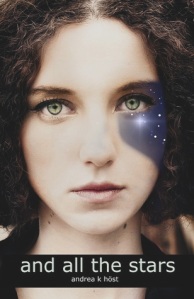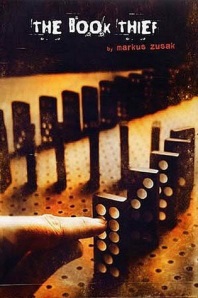Come for the apocalypse.
Stay for cupcakes.
Die for love.
Madeleine Cost is working to become the youngest person ever to win the Archibald Prize for portraiture. Her elusive cousin Tyler is the perfect subject: androgynous, beautiful, and famous. All she needs to do is pin him down for the sittings.
None of her plans factored in the Spires: featureless, impossible, spearing into the hearts of cities across the world – and spraying clouds of sparkling dust into the wind.
Is it an alien invasion? Germ warfare? They are questions everyone on Earth would like answered, but Madeleine has a more immediate problem. At Ground Zero of the Sydney Spire, beneath the collapsed ruin of St James Station, she must make it to the surface before she can hope to find out if the world is ending.
Review:
For me, the twists and plot reveals in And All the Stars are among the novel’s strongest points, so this review will be vague and short in order to prevent spoilage.
This is a marvelous scifi/post-apocalyptic YA novel (there are tinges of romance and lots of action as well, so basically every genre ever is represented here). Here are the top reasons why you should read it:
1. a hilarious and original cast of characters: why is it that fictional characters are so much better than most of the people I interact with in real life? I always lament this fact, and in And All the Stars I met a bunch of new characters that struck me down with this sadness again. From Madeleine, the artsy protagonist, to Noi, the no-nonsense best friend, to all the boys from a local boarding school, there are too many possible favorites. Bonus factor: the characters are diverse! Go away completely heterosexual, white casts! And All the Stars features multiple races and sexual orientations.
2. an ode to friendship: if required to provide a main theme from this book, I’d say friendship and the importance of having people to rely on. This theme is well explored, especially through the inclusion of the aforementioned outstanding characters and their constant allusions to Dumas’ The Three Musketeers. All for one, one for all!
3. awesome plot twists: no elaboration here, because I want readers to experience them personally, but oh my god, they are worth it. Even minor plot reveals were stunning and really upped the stakes (not that they weren’t sufficiently upped, you know, with the apocalypse and all)
Some things I didn’t like (but shouldn’t discourage you from reading it!):
1. action scenes could be confusing: In scenes with a lot of movement and fighting, I can get a little lost in who is doing what to whom.
2. mushy, overly feel-good epilogue: Another weakness I’ve noticed with Höst; she is a bit prone to overly perfect endings. This one especially stung since the final line of the actual book was so wonderfully ambiguous, which was then marred by the epilogue. It was somewhat ameliorated by a pretty good but not quite as good final epilogue line.
This is simply a fun read. I was particularly impressed because having read some of Höst’s earlier work, I can see that her craft has greatly improved, though it wasn’t too shabby to begin with! She is a promising author that I will be watching closely.
4 out of 5 stars

